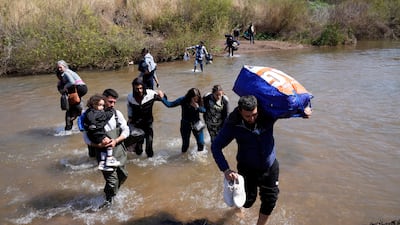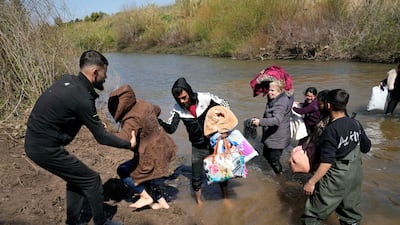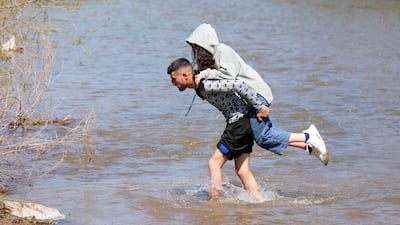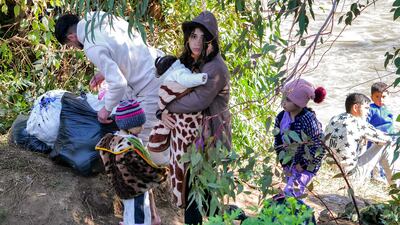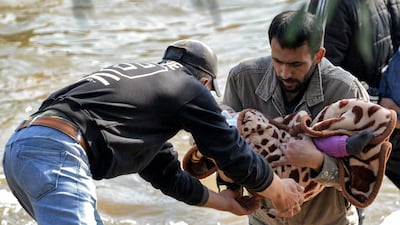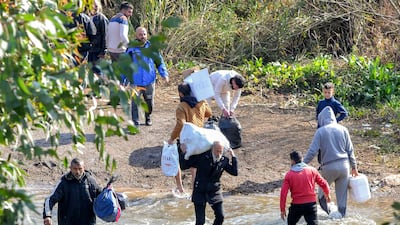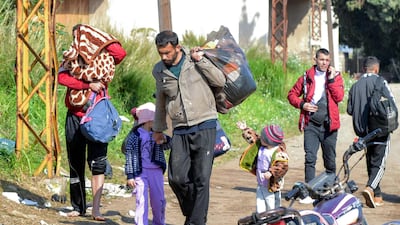Ten thousand members of the Alawite minority fleeing sectarian violence in Syria have crossed into Lebanon in the past five days and settled in northern towns and areas, Lebanese security sources said on Monday. The situation has heightened tension and rekindled past conflicts.
Lebanon now fears that sectarian violence from Syria’s coast could once again spill over into its volatile north in the adjacent Bab Al Tebbaneh and Jabal Mohsen districts of Tripoli, where Sunni and Alawite gunmen have engaged in deadly clashes several times in the past 15 years.
At least 1,300 people, including 800 civilians, most of them Alawites, have been killed in Syria since Thursday, according to the Syrian Observatory for Human Rights, a war monitor based in the UK. The wave of sectarian violence comes amid clashes between pro-government troops and opposing armed groups, who Damascus accuses of being loyal to the regime of former president Bashar Al Assad.
Since the rebels took over in December, there have been campaigns on the coastal areas in which killings of members of the minority group have been reported, as well as some casualties from the security troops. The latest attack on the coast started last week after two members of the pro-government forces were killed in an ambush.
“Around 10,000 Alawites have crossed from Syria to Lebanon in the last five days. They have settled in Tripoli and nearby areas, creating a sensitive situation across Lebanon. The feeling now is that things could explode in the north at any moment,” one of the security sources said.
“State forces have deployed a security belt around the predominantly Alawite Jabal Mohsen area. There have been several confrontations, and the situation remains very fragile."
Tripoli is home to 200,000 people, 80 per cent of whom are Sunni Muslims, 6 to 7 per cent Alawites and the rest Christians. Residents of Bab Al Tebbaneh supported the uprising against Mr Al Assad, while those in Jabal Mohsen backed him. They have fought frequently since the Syrian civil war erupted in March 2011.
Small radical Sunni organisations in Lebanon have also sent men across the border to fight alongside the rebels during the conflict.
Attacking Lebanon
The collapse of Syria's army in December has flooded the country with firearms, pushing Lebanese gun dealers to profit by purchasing cheap guns and smuggling them into Lebanon. The price of an AK-47, for example, was about $25, security sources have told The National. Thousands of arms had been smuggled through illegal border crossings, especially in the north.
As the rebels looked set to take over Damascus, Lebanon immediately closed all its land border crossings with Syria except for a main one that links Beirut with the Syrian capital. But many of the illegal border crossings, especially in the north, kept running.
Lebanon has struggled with the widespread presence of firearms and weaponry, with the ruling establishment, which has governed since the civil war that lasted between 1975 and 1990, remaining heavily armed. Among the dominant groups is Hezbollah, which fought a prolonged and devastating war with Israel that ended last November following a US-brokered ceasefire.
Another security official warned of far more dangerous consequences stemming from the sectarian killings in Syria and the flight of Alawites to Lebanon.
“Syria’s pro-government armed groups could decide to invade Lebanon from the north to pursue wanted Alawites, with the help of local allied groups,” the source explained. The official added that Syrian gunmen have been amassing troops along the border with Lebanon, particularly on the eastern borders near the Bekaa Valley.

Last February, violence escalated at the Lebanon-Syria border between Lebanese clans and Syrian security troops as the government in Damascus intensified efforts to disrupt smuggling routes in an area where Hezbollah wields significant influence.
Syria later announced a large-scale security operation aimed at shutting down smuggling routes along the border, focusing on the village of Haweek and surrounding areas in western Homs province. The move led to clashes with Lebanese clan members.
Since taking power, Syria’s new government, led by the Hayat Tahrir Al Sham group – previously linked to Al Qaeda and Al Nusra Front – has prioritised cracking down on Hezbollah-linked smugglers in an effort to secure the border with Lebanon. The campaign has significantly disrupted smuggling networks used by Hezbollah, which was a key ally of the Assad regime.
“They could attack Lebanon from the north to chase Alawites. But the bigger concern is the Bekaa region, where there are fears that HTS could attempt to enter Lebanon from that area to launch a major offensive against Hezbollah,” the official warned.
